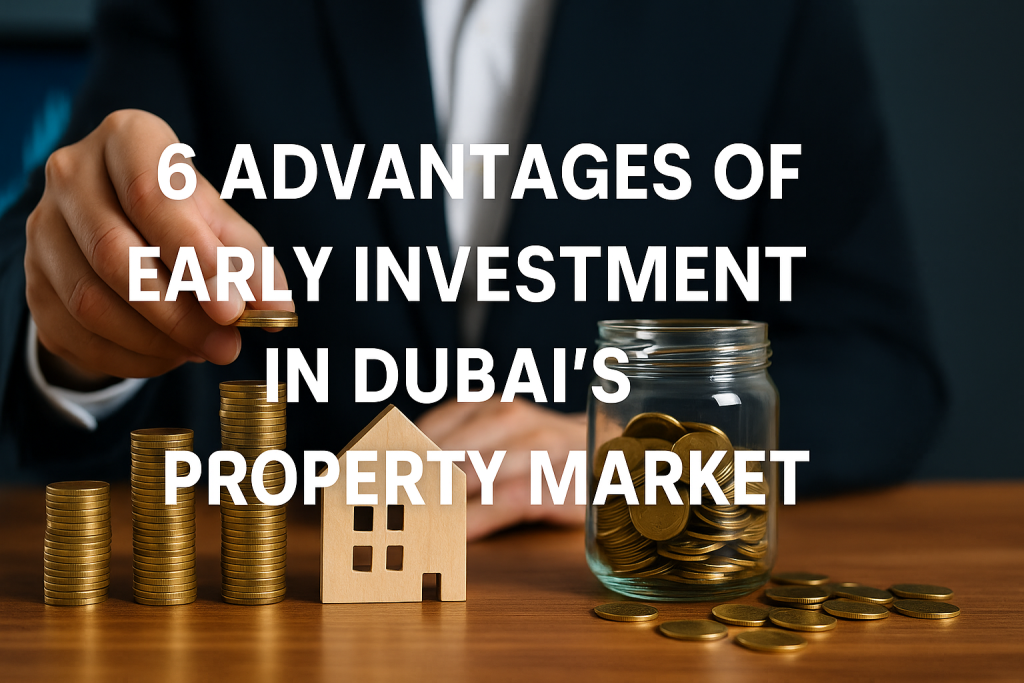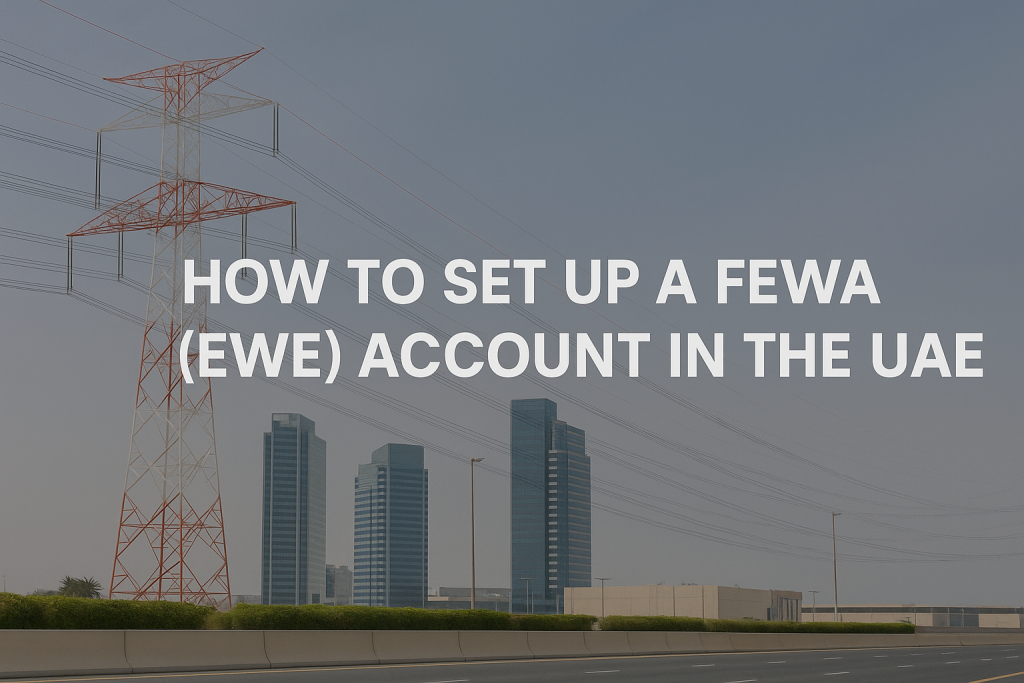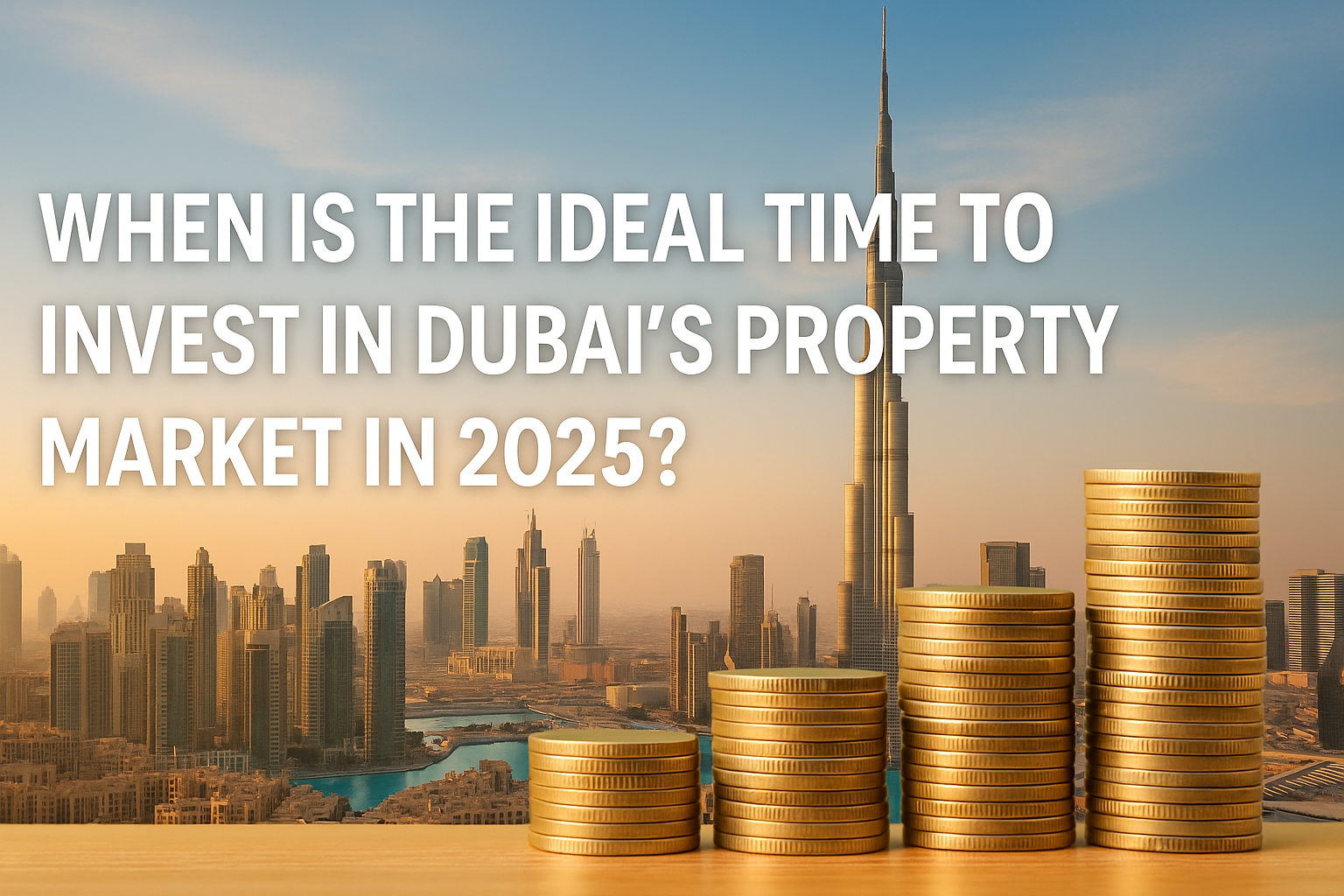

Table of Contents
- Introduction
- Dubai’s Property Market Outlook in 2025
- Why Timing Matters in Real Estate Investment
- Early 2025: A High-Momentum Entry Window
- Mid-2025: Watch for Signs of a Plateau
- Late 2025: Preparing for Possible Market Corrections
- Segment-Specific Timing Strategies
- Location Hotspots to Watch
- Rental Yields and Investment Horizons
- Key Risks to Monitor
- Case Study: Dubai South and Expo City Growth
- Mistakes Investors Should Avoid
- Conclusion
- Frequently Asked Questions
- Unlock Dubai’s Property Potential with Homecubes
Introduction
In real estate, timing is everything. For investors eyeing Dubai, knowing the best time invest Dubai property in 2025 is critical to maximizing returns while minimizing risks.
Dubai’s property market has evolved rapidly over the last few years, shaped by strong investor demand, ambitious infrastructure projects, and global positioning as a tax-friendly hub. But in 2025, if you want to thrive as a Dubai property investor, timing entry points is more important than ever due to potential price fluctuations, rental yield shifts, and upcoming regulatory changes.
This comprehensive guide breaks down the latest data, emerging trends, and expert forecasts so you can make informed investment decisions.
Dubai’s Property Market Outlook in 2025
Dubai saw 23 >AED 30m property sales in March 2025, according to @ValuStrat data.
Once again, Business Bay and Palm Jumeirah were among the most popular prime neighbourhoods.
Our Emirate’s ultra-luxury real estate segment is proving as resilient as it is popular.… pic.twitter.com/lgqnJwfmqa
— Abbas Sajwani عباس سجواني (@Abbas_H_Sajwani) May 19, 2025
Dubai’s property market continues to attract local and global investors thanks to its zero property tax, investor-friendly visa policies, and robust infrastructure expansion. Here’s what the data says:
- Historic H1 2025 activity: Real estate transactions totaled AED 431 billion across 125,538 deals in H1 2025 — a +25% YoY rise in value and +26% in volume compared to H1 2024.
→ Source: Dubai real estate transactions exceed AED431 billion in H1 2025 - Prices remain strong: According to Knight Frank, Q1 2025 residential prices are up 3.7% QoQ and 17.6% above their 2014 peak, with AED 114.7bn transacted across 43,000 sales.
→ Source (PDF): Knight Frank – Dubai Residential Market Review Q1 2025 - Economic backdrop supports demand: The IMF forecasts UAE real GDP growth of ~4.0% in 2025, underpinning sustained investor confidence.
→ Source: IMF – United Arab Emirates (At a Glance)
Despite bullish fundamentals, analysts warn that oversupply in some segments could create localized corrections later in 2025.
Why Timing Matters in Real Estate Investment
Dubai’s real estate market doesn’t move in a straight line — it follows distinct cycles. Knowing the best time invest Dubai property in 2025 depends on understanding:
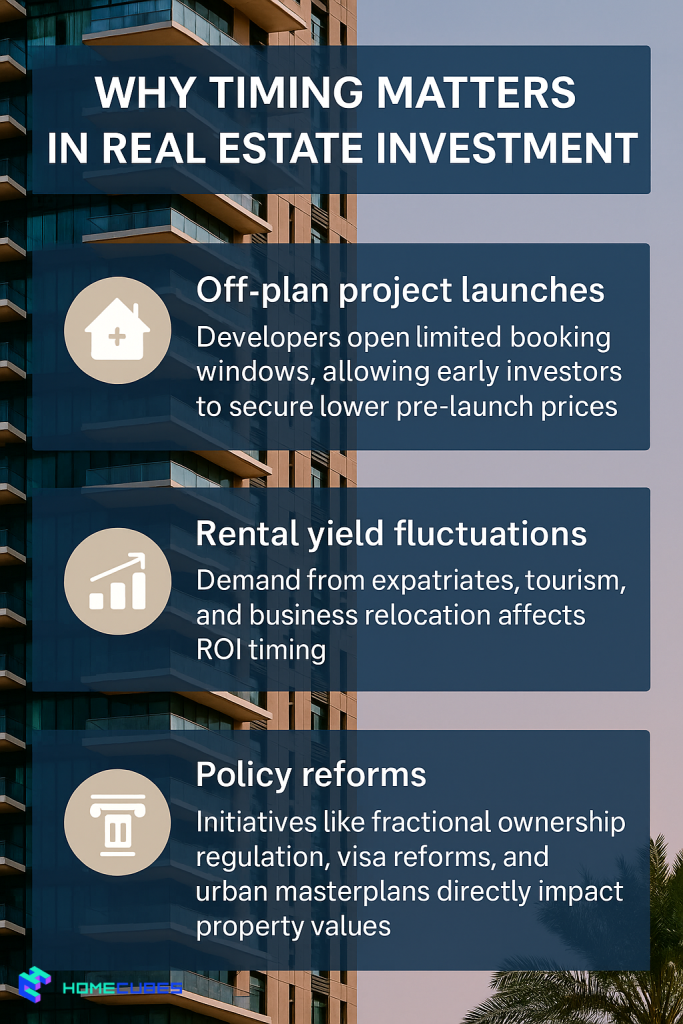
- Off-plan project launches: Developers open limited booking windows, allowing early investors to secure lower pre-launch prices.
- Rental yield fluctuations: Demand from expatriates, tourism, and business relocation affects ROI timing.
- Policy reforms: Initiatives like fractional ownership regulation, visa reforms, and urban masterplans directly impact property values.
Early 2025: A High-Momentum Entry Window
The first half of 2025 represents one of the strongest buying windows:
- Developers are launching premium off-plan projects with flexible payment terms.
- Demand remains high, creating healthy resale liquidity.
- Rental yields are stable, especially in mid-market segments like Dubai South and JVC.
For investors seeking capital appreciation, early 2025 offers access to projects before supply peaks.
Mid-2025: Watch for Signs of a Plateau
By mid-2025, several analysts expect slower price growth in certain areas due to increased launches:
- Oversupply concerns in apartment-heavy districts may cap gains.
- Investors should target quality-driven projects with strong infrastructure links.
- Focusing on emerging micro-markets can protect ROI in flattening phases.
Late 2025: Preparing for Possible Market Corrections
As 2025 draws to a close, the likelihood of localized price dips in oversupplied communities increases:
- Bargain opportunities could emerge in high-density apartment zones.
- Ready-to-move luxury properties will remain more stable but negotiable.
- Fractional ownership becomes a way for investing in Dubai real estate with limited funds, and an attractive hedge for premium investments.
For patient investors, late 2025 may unlock discounted entry points.
Segment-Specific Timing Strategies
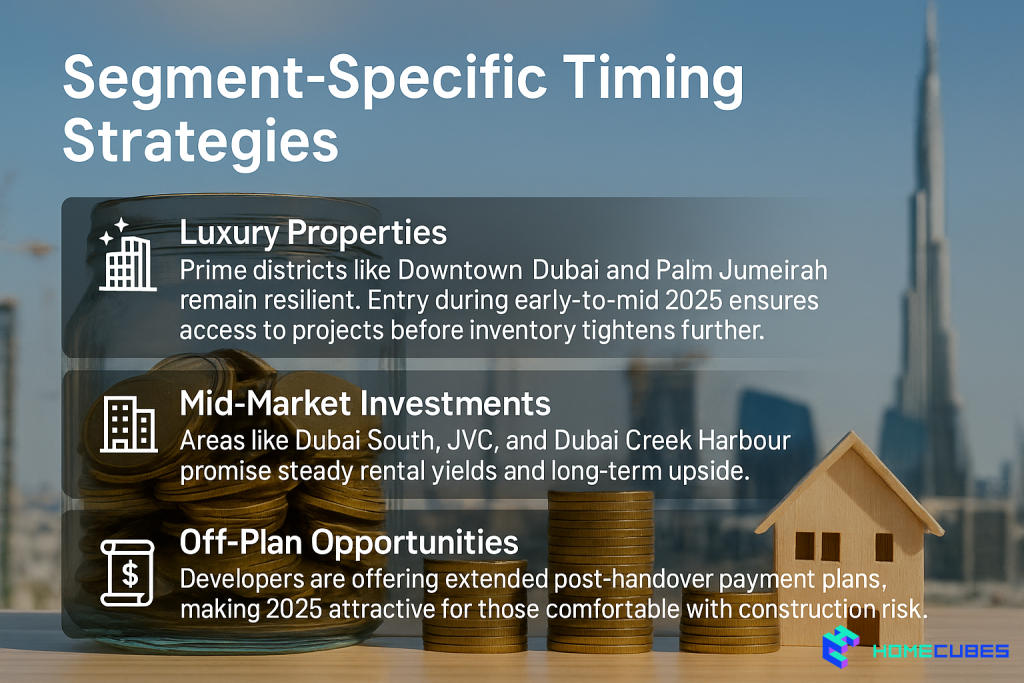
Luxury Properties
- Prime districts like Downtown Dubai and Palm Jumeirah remain resilient.
- Entry during early-to-mid 2025 ensures access to projects before inventory tightens further.
Mid-Market Investments
- Areas like Dubai South, JVC, and Dubai Creek Harbour promise steady rental yields and long-term upside.
- Early 2025 is the sweet spot to secure competitive pre-launch pricing.
Off-Plan Opportunities
- Developers are offering extended post-handover payment plans, making 2025 attractive for those comfortable with construction risk.
- Early booking maximizes equity potential before handover.
Location Hotspots to Watch
| Area | Investment Appeal | Ideal Timing |
| Dubai South | Expo City expansion + new airport | Early 2025 |
| JVC | Affordable mid-market yields | Q1–Q3 2025 |
| Downtown Dubai | Luxury hub + global demand | Early–mid 2025 |
| Dubai Creek Harbour | Waterfront lifestyle + urban growth | Early 2025 |
Rental Yields and Investment Horizons
Dubai offers some of the highest global rental yields in 2025:
- Average gross yields sit between 6% and 8%, outperforming most major cities.
- Dubai South and JVC are leading performers with yields above citywide averages.
- Investors with 5–7 year horizons can expect steady income alongside robust capital gains.
Key Risks to Monitor
- Oversupply pressure in apartment-heavy areas
- Global macroeconomic volatility impacting foreign demand
- Rising service charges eating into net yields
- Evolving regulatory frameworks for foreign ownership and fractional models
Case Study: Dubai South and Expo City Growth
Dubai South is one of 2025’s standout investment zones:
- The Expo City redevelopment and Al Maktoum Airport expansion are driving unprecedented growth.
- New metro extensions make the area highly accessible.
- Long-term projections suggest 35%–40% appreciation by 2030 for early entrants.
Mistakes Investors Should Avoid
- Entering overheated sub-markets at peak pricing
- Ignoring developer reputation and project timelines
- Underestimating long-term supply risks
- Overlooking hidden costs like maintenance fees and registration charges
Conclusion
Dubai’s property market in 2025 presents multiple strategic entry windows:
- Early 2025: High momentum, off-plan launches, and strong demand
- Mid-2025: Slowing growth; best for careful selection and infrastructure-backed zones
- Late 2025: Potential price dips offering value-driven entry points
By aligning your investment strategy with verified data, macro trends, and area-specific insights, you can secure the best time invest Dubai property while minimizing risks. With Homecubes as your partner, fractional models make diversifying into Dubai’s thriving market more accessible than ever.
Frequently Asked Questions
- When is the best time to invest in Dubai property in 2025?
Early to mid-2025 is ideal for growth; late-2025 favors value-seeking buyers. - Will Dubai property prices fall in 2025?
Localized softening may occur in oversupplied districts, but fundamentals remain positive. - Which areas are best for long-term ROI?
Dubai South, JVC, Downtown Dubai, and Dubai Creek Harbour lead the pack. - Are rental yields attractive in 2025?
Yes — Dubai maintains 6%–8% yields, significantly above global averages. - Is off-plan investment safe?
Yes, provided you choose reputable developers and review timelines carefully.
Unlock Dubai’s Property Potential with Homecubes
Timing matters — but so does strategy. At Homecubes, we help you pinpoint the best time invest Dubai property in 2025 using data-driven insights and fractional ownership solutions.
Whether you want exposure to high-growth hubs like Dubai South or prime luxury assets downtown, we simplify access through compliant, transparent structures.
Our VARA license is currently in process, ensuring Homecubes aligns with Dubai’s evolving real estate regulations.
Connect with Homecubes today to explore fractional ownership opportunities tailored to your investment goals.







